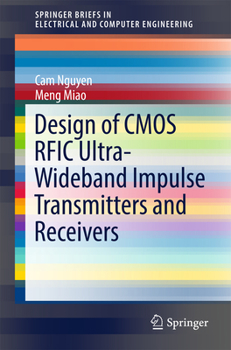Design of CMOS Rfic Ultra-Wideband Impulse Transmitters and Receivers
(Part of the SpringerBriefs in Electrical and Computer Engineering Series)
This book presents the design of ultra-wideband (UWB) impulse-based transmitter and receiver frontends, operating within the 3.1-10.6 GHz frequency band, using CMOS radio-frequency integrated-circuits (RFICs). CMOS RFICs are small, cheap, low power devices, better suited for direct integration with digital ICs as compared to those using III-V compound semiconductor devices. CMOS RFICs are thus very attractive for RF systems and, in fact, the principal choice for commercial wireless markets.
The book comprises seven chapters. The first chapter gives an introduction to UWB technology and outlines its suitability for high resolution sensing and high-rate, short-range ad-hoc networking and communications. The second chapter provides the basics of CMOS RFICs needed for the design of the UWB RFIC transmitter and receiver presented in this book. It includes the design fundamentals, lumped and distributed elements for RFIC, layout, post-layout simulation, and measurement. The third chapter discusses the basics of UWB systems including UWB advantages and applications, signals, basic modulations, transmitter and receiver frontends, and antennas. The fourth chapter addresses the design of UWB transmitters including an overview of basic components, design of pulse generator, BPSK modulator design, and design of a UWB tunable transmitter. Chapter 5 presents the design of UWB receivers including the design of UWB low-noise amplifiers, correlators, and a UWB 1 receiver. Chapter 6
covers the design of a UWB uniplanar antenna. Finally, a summary and conclusion is given in Chapter 7.




